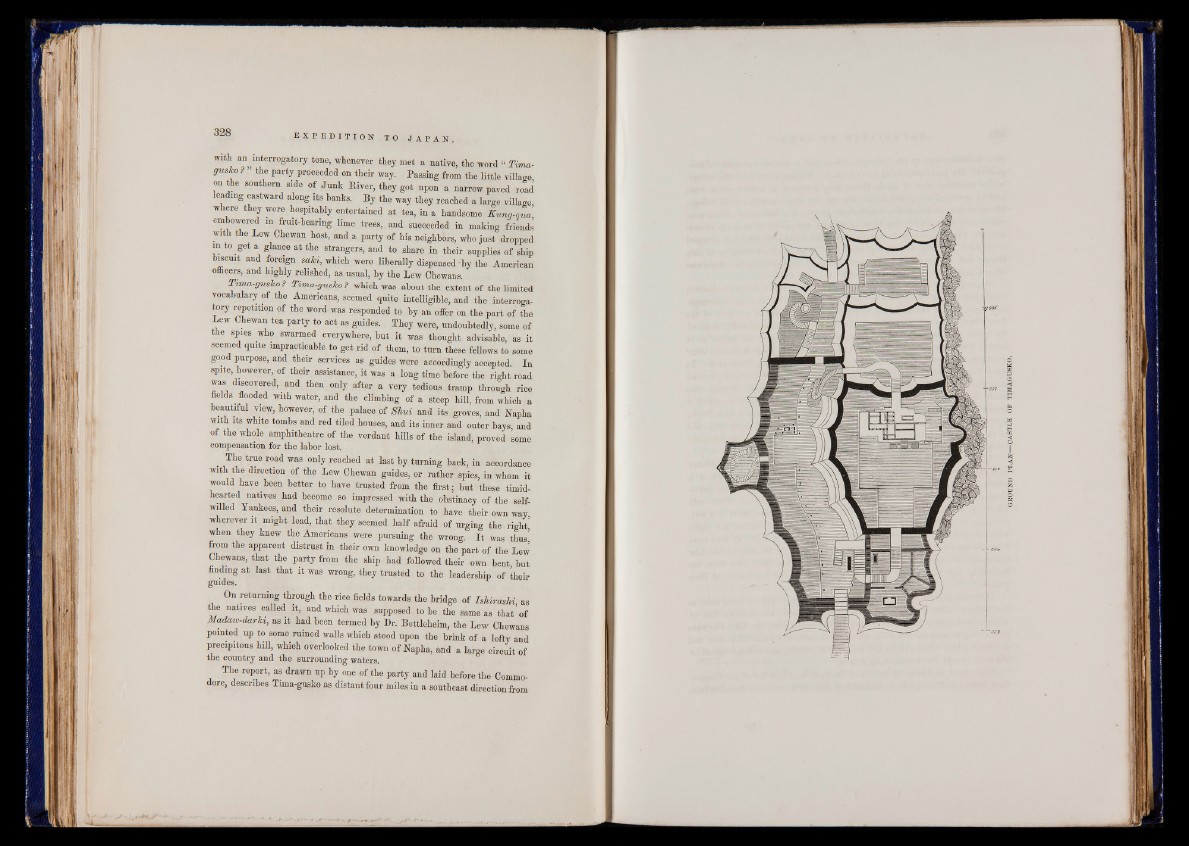
with an interrogatory tone, whenever they met a native, the word “ Tima-
gusko t the party proceeded on their way. Passing from the little village
on the southern side of Junk Kiver, they got upon a narrow paved road
leading eastward along its banks. By the way they reached a large village,
w ere they were hospitably entertained at tea, in a handsome Kung-qua,
embowered m fruit-bearing lime trees, and succeeded in making friends
with the Lew Chewan host, and a party of his neighbors, who just dropped
m to get a glance at the strangers, and to share in their supplies of ship
biscuit and foreign saki, which were liberally dispensed by the American
officers, and highly relished, as usual, by the Lew Chewans.
Tima-gusko ? Tima-gusko ? which was about the extent of the limited
vocabulary of the Americans, seemed quite intelligible, and the interrogatory
repetition of the word was responded to by an offer on the part of the
Lew Chewan tea party to act as guides. They were, undoubtedly, some of
the spies who swarmed everywhere, but it was thought advisable, as it
seemed quite impracticable to get rid of them, to turn these fellows to some
good purpose, and their services as guides were accordingly accepted. In
spite, however, of their assistance, it was a long time before the right road
was discovered, and then only after a very tedious tramp through rice
fields flooded with water, and the climbing of a steep hill, from which a
beautiful view, however, of the palace of Shui and its groves, and Napha
with its white tombs and red tiled houses, and its inner and outer bays and
of the whole amphitheatre of the verdant hills of the island, proved some
compensation for the labor lost.
. The true road was only reached at last by turning back, in accordance
with the direction of the Lew Chewan guides, or rather spies, in whom it
would have been better to have trusted from the first; but these timid-
hearted natives had become so impressed with the obstinacy of the self-
willed Yankees, and their resolute determination to have their own way
wherever it might lead, that they seemed half afraid of urging the-right
when they knew the Americans were pursuing the wrong. I t was thus’
from the apparent distrust in their own knowledge on the part of the Lew
Chewans, that the party from the ship had followed their own bent, but
finding at last that it was wrong, they trusted to the leadership of their
guides.
On returning through the rice fields towards the bridge of Ishirashi as
the natives called it, and which was supposed to be the same as that’of
Madaw-darki, as it had been termed by Dr. Bettleheim, the Lew Chewans
pointed up to some ruined walls which stood upon the brink of a lofty and
precipitous hill, which overlooked the town of Napha, and a large circuit of
the country and the surrounding waters.
The report, as drawn up by one of the party and laid before the Commodore,
describes Tima-gusko as distant four miles in a southeast direction from